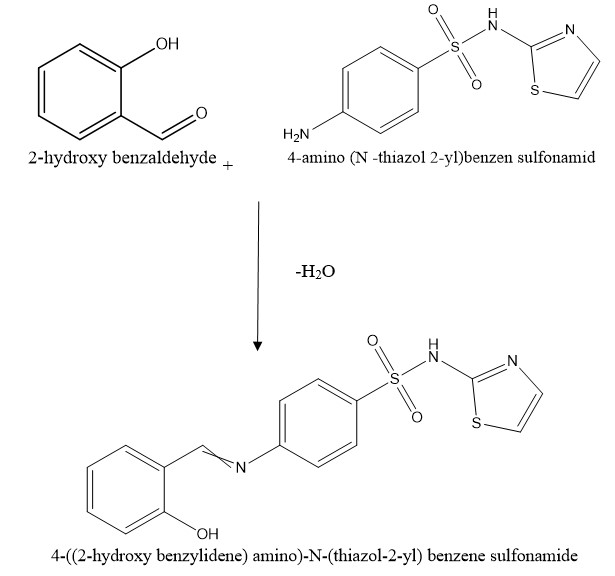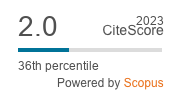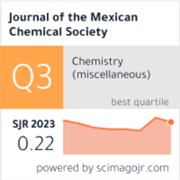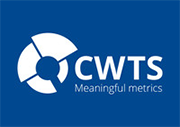Quantum Computational Chemistry and Optoelectronic Properties of a New Synthesis Organic Compound
DOI:
https://doi.org/10.29356/jmcs.v68i3.1946Keywords:
13C NMR, 1H NMR, FTIR, UV-visible spectrum, C16H13N3O3S2Abstract
Abstract. For useful photovoltaic technology applications, organic materials with interesting electrical and optoelectronic properties are in great demand. Research on synthetic small organic molecules has gained great attraction for their potential applications in low-cost, ultra-thin and flexible commodities. They are also expected to play a transformative role in life today. 4-((2-hydroxy benzylidene) amino)-N-(thiazol-2-yl) benzenesulfonamide produced by using many important identification tools such as 13C NMR, 1H NMR, FTIR and UV-visible spectrum. In this study, there are some parameters such as band gap energy, refractive index, reflectivity, dielectric constant, electrical and optical conductivity to find suitable applications such as solar cells and photovoltaics. Based on quantum computational chemistry, HOMO, LUMO, band gap energy, ionization energy, softness, hardness, electronegativity, electrophilicity, nucleophilicity, electron transfer and back donation energy were calculated by using DFT at the (B3LYP/6-311++G(d, p)) level.
Resumen. Para la aplicación útil en tecnologías fotovoltaicas se requiere de materiales orgánicos con propiedades eléctricas y optoelectrónicas específicas. La investigación de moléculas orgánicas pequeñas ha ganado interés por sus aplicaciones potenciales como materias primas ultradelgadas y flexibles. También se espera que jueguen un papel transformador en la vida cotidiana. Se estudió el 4-((2-hidroxibencilidén) amino)-N-(thiazol-2-il) bencénesulfonamida con varias espectroscopías tales como 13C NMR, 1H NMR, FTIR y UV-visible. Para la aplicación de estos compuestos en celdas solares y dispositivos fotovoltaícos es necesario conocer parámetros como la brecha o gap de energía, el índice de refracción, la constante dieléctrica, y las conductividades eléctricas y ópticas. Utilizando la DFT con la metodología B3LYP/6-311++G(d, p), se calcularon las siguientes propiedades: energías del HOMO y LUMO, brecha (gap) HOMO-LUMO, primer potencial de ionización, blandura, dureza, electronegatividad, electrofilicidad, nucleofilicidad, transferencia electrónica y retrodonación.
Downloads
References
Forrest, S.R. IEEE J. Sel. Top. Quantum Electron. 2000, 6, 1072-1083. DOI: https://doi.org/10.1109/2944.902156.
Yakuphanoglu, F.; Şenkal, B. J. Phys. Chem. C. 2007, 111, 1840-1846. DOI: https://doi.org/10.1021/jp0653050.
Yao, L.; Rahmanudin, A.; Guijarro, N.; Sivula, K. Adv. Energy Mater. 2018, 8, 1802585. DOI: https://doi.org/10.1002/aenm.201802585.
Qadr, H.M. At. Indones. 2020, 46, 47-51. DOI: https://doi.org/10.17146/aij.2020.923.
Liu, C.; Cheng, Y.-B.; Ge, Z. Chem. Soc. Rev. 2020, 49, 1653-1687. DOI: https://doi.org/10.1039/C9CS00711C.
Qadr, H.M. Russ. J. Non-Ferr. 2021, 62, 561-567. DOI: https://doi.org/10.3103/S1067821221050096.
Brabec, C.J.; Sariciftci, N.S.; Hummelen, J.C. Adv. Funct. Mater. 2001, 11, 15-26. DOI: https://doi.org/10.1002/1616-3028(200102)11:1%3C15::AID-ADFM15%3E3.0.CO;2-A. DOI: https://doi.org/10.1002/1616-3028(200102)11:1<15::AID-ADFM15>3.3.CO;2-1
Dennler, G.; Sariciftci, N.S. Proc. IEEE. 2005, 93, 1429-1439. DOI: https://doi.org/10.1109/JPROC.2005.851491.
Nakano, K.; Tajima, K. Adv. Mater. 2017, 29, 1603269. DOI: https://doi.org/10.1002/adma.201603269.
Mamand, D.M.; Qadr, H.M. Corros. Rev. 2023, 41, 427-441. DOI: https://doi.org/10.1515/corrrev-2022-0085.
Ozpineci, B.; Tolbert, L.M. in: Comparison of wide-bandgap semiconductors for power electronics applications, United States. Department of Energy, 2004. DOI: https://doi.org/10.2172/885849
Elasser, A.; Chow, T.P. Proc. IEEE. 2002, 90, 969-986. DOI: https://doi.org/10.1109/JPROC.2002.1021562.
Mamand, D.M.; Anwer, T.M.K.; Qadr, H.M. J. Indian Chem. Soc. 2023, 100, 101018. DOI: https://doi.org/10.1016/j.jics.2023.101018.
Iacopi, F.; Van Hove, M.; Charles, M.; Endo, K. Mrs Bull. 2015, 40, 390-395. DOI: https://doi.org/10.1557/mrs.2015.71.
Neudeck, P.G.; Okojie, R.S.; Chen, L.-Y. Proc. IEEE. 2002, 90, 1065-1076. DOI: https://doi.org/10.1109/JPROC.2002.1021571.
Reich, B.; Hakim, E.B. Microelectron. Reliab. 1976, 15, 29-33. DOI: https://doi.org/10.1016/0026-2714(76)90138-4.
Torres, R.A.; Dai, H.; Lee, W.; Jahns, T.M.; Sarlioglu, B. in: 2018 IEEE Transportation Electrification Conference and Expo (ITEC), IEEE, 2018, 1002-1008.
Shi, J.; Zhang, J.; Yang, L.; Qu, M.; Qi, D.-C.; Zhang, K.H. Adv. Mater. 2021, 33, 2006230. DOI: https://doi.org/10.1002/adma.202006230.
Nunn, W.; Truttmann, T.K.; Jalan, B. J. Mater. Res. 2021, 1-19. DOI: https://doi.org/10.1557/s43578-021-00377-1.
Wang, P.; Xiao, H.; Duan, C.; Wen, B.; Li, Z. Polym. Degrad. Stab. 2020, 173, 109078. DOI: https://doi.org/10.1016/j.polymdegradstab.2020.109078.
Gündüz, M.G.; Tahir, M.N.; Armaković, S.; Koçak, C.Ö.; Armaković, S.J. J. Mol. Struct. 2019, 1186, 39-49. DOI: https://doi.org/10.1016/j.molstruc.2019.03.010.
Aziz, D.M.; Azeez, H.J. J. Mol. Struct. 2020, 1222, 128904. DOI: https://doi.org/10.1016/j.molstruc.2020.128904.
Hussein, M.; Nasir, E.; Al-Aarajiy, A. Int. J. Thin Film Sci. Tec. 2012, 1, 71-76.
Ajayaghosh, A. Chem. Soc. Rev. 2003, 32, 181-191. DOI: https://doi.org/10.1039/B204251G.
Mamand, D.M.; Anwer, T.M.K.; Qadr, H.M. Oxid. Commun. 2022, 45, 600-627.
Mamand, D.M.; Qadr, H.M. Prot. Met. Phys. Chem. 2021, 57, 943-953. DOI: https://doi.org/10.1134/S207020512105018X.
Orek, C.; Gündüz, B.; Kaygili, O.; Bulut, N. Chem. Phys. Lett. 2017, 678, 130-138. DOI: https://doi.org/10.1016/j.cplett.2017.04.050.
Sassi, M.; Oueslati, A.; Moutia, N.; Khirouni, K.; Gargouri, M. Ionics. 2017, 23, 847-855. DOI: https://doi.org/10.1007/s11581-016-1903-y.
Mamand, D.M.; Qadr, H.M. Russ. J. Phys. Chem. A. 2022, 96, 2155-2165. DOI: https://doi.org/10.1134/S0036024422100193.
Epstein, R.; Sheik-Bahae, M.; Hehlen, M. in: Science and Applications of Laser Cooling of Solids., Wiley. 2009. DOI: https://doi.org/10.1002/9783527628049,
Turan, N.; Kaya, E.; Gündüz, B.; Çolak, N.; Körkoca, H. Fibers Polym. 2012, 13, 415-424. DOI: https://doi.org/10.1007/s12221-012-0415-2,
Tripathy, S. Opt. Mater. 2015, 46, 240-246. DOI: https://doi.org/10.1016/j.optmat.2015.04.026.
Brust, D.; Phillips, J.; Bassani, F. Phys. Rev. Lett. 1962, 9, 94. DOI: https://doi.org/10.1103/PhysRevLett.9.94.
Mamand, D.M.; Anwer, T.M.K.; Qadr, H.M.; Mussa, C.H. Russ. J. Gen. Chem. 2022, 92, 1827-1838. DOI: https://doi.org/10.1134/S1070363222090249.
Silveira, F.; Kurcbart, S. EPL. 2010, 90, 44004. DOI: https://doi.org/10.1209/0295-5075/90/44004.
Akinlami, J.; Olateju, I. in: Semicond. phys. quantum electron. optoelectron. 2012, 281-284.
Qadr, H.M.; Mamand, D.M. Azerbaijan Chem. J. 2023, 19-29. DOI: https://doi.org/10.32737/0005-2531-2023-2-19-29.
Gebhard, F. in: The Mott Metal-Insulator Transition. 1997, 1-48. DOI: https://doi.org/10.1007/3-540-14858-2_1.
Bade, W.L. J. Chem. Phys. 1957, 27, 1280-1284. DOI: https://doi.org/10.1063/1.1743991.
Rajkumar, M.; Saravanabhavan, M.; Chandramohan, A. Opt. Mater. 2017, 72, 247-256. DOI: https://doi.org/10.1016/j.optmat.2017.06.011.
Koops, C. Phys. Rev. 1951, 83, 121. DOI: https://doi.org/10.1103/PhysRev.83.121.
Qadr, H.M.; Mamand, D.M. J. Bio- Tribo-Corros. 2021, 7, 140. DOI: https://doi.org/10.1007/s40735-021-00566-9.
Mamand, D.M.; Qadr, H.M. Him. Fiz. Tehnol. Poverhni. 2023, 14, 159-172. DOI: http://jnas.nbuv.gov.ua/article/UJRN-0001412158. DOI: https://doi.org/10.15407/hftp14.02.159
Erdoğan, Ş.; Safi, Z.S.; Kaya, S.; Işın, D.Ö.; Guo, L.; Kaya, C. J. Mol. Struct. 2017, 1134, 751-761. DOI: https://doi.org/10.1016/j.molstruc.2017.01.037.
Pearson, R.G. PNAS. 1986, 83, 8440-8441. DOI: https://doi.org/10.1073/pnas.83.22.8440.
Mamand, D.M.; Awla, A.H.; Anwer, T.M.K.; Qadr, H.M. Chim. Techno Acta. 2022, 9, 20229203. DOI: https://doi.org/10.15826/chimtech.2022.9.2.03.


Downloads
Published
Issue
Section
License
Copyright (c) 2024 Hiwa Mohammad Qadr, Dyari Mustafa Mamand, Dara Muhammed Aziz, Awat Hamad Awla

This work is licensed under a Creative Commons Attribution-NonCommercial 4.0 International License.
Authors who publish with this journal agree to the following terms:
- Authors retain copyright and grant the journal right of first publication with the work simultaneously licensed under a Creative Commons Attribution License that allows others to share the work with an acknowledgement of the work's authorship and initial publication in this journal.
- Authors are able to enter into separate, additional contractual arrangements for the non-exclusive distribution of the journal's published version of the work (e.g., post it to an institutional repository or publish it in a book), with an acknowledgement of its initial publication in this journal.









